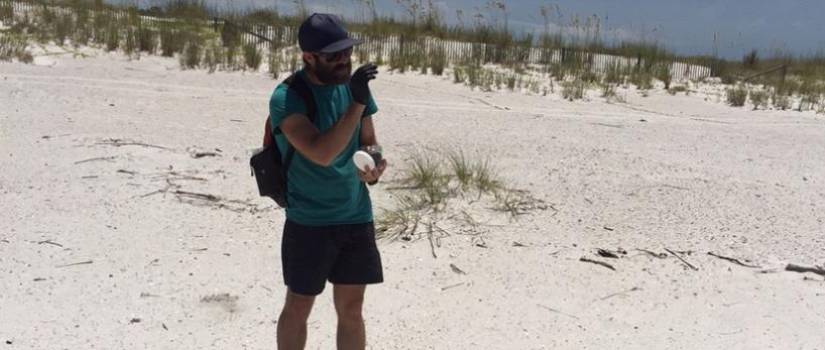After working in the lab for hundreds of hours, Joel Bostic, a second-year Master’s student in the Marine Science Program, was in a state of disbelief when the radiocarbon results came in. “I couldn’t believe it. I crunched the numbers again to be sure, to prove to myself that the data were real. Those results were the culmination of a lot of hard work.” The data in question marked an exciting discovery for Bostic and his collaborators: microbes indigenous to the Gulf of Mexico were actually eating the oil left over from the 2010 Deepwater Horizon spill.
Until now, other scientists had analyzed and classified these oil-dwelling microbes, but no one had yet proven that they were actually eating the oil’s organic compounds. “Going into this project, we knew that microbes were found to be living on the surface of the oil and possibly eating other matter, but we weren’t sure if they were eating the oil itself.” Joel’s research represents a new way of envisioning microbial relationships with oil, one that holds much potential for considering the future of oil in the Gulf of Mexico and elsewhere.
Several key environmental questions guided Joel’s research: “What is the fate of the oil? Will it persist indefinitely on beaches? Will the microbes degrade it?” In order to answer these questions, Bostic had the unique opportunity as a graduate student to collect samples in the field for analysis in the lab.
The experience began during the summer of 2015. Joel and Alex Holland, an undergraduate Marine Science student, traveled to three sites along the Gulf Coast to collect sand patties, which are small lumps of black sand held together by oil. These patties, home to the microbes of interest to Joel, were then taken back to the lab for study. He then spent several months conducting extractions, doubting, all the while, that microbes were actually eating the oil. Prior to entering the graduate program, Joel did not anticipate that marine scientists would spend so much of their time in the lab. However, throughout the course of this project, he has come to love that part of the work. “Lab work can be tedious,” he says, “but there are big payoffs which make it worth it. A scientist might collect samples for four or five days and then spend a couple of years working with those samples in the lab. It’s intense, but we get to answer cool questions in the lab.”
One of those exciting answers came to Joel in January of 2016 when he and his collaborators and co-authors learned that microbes had, in fact, been decomposing the oil’s organic components. Joel is now in the process of writing up the results of this study, and he will submit his findings for publication by this summer.
In addition to devoting much time to his own research, Joel also teaches an undergraduate course, Marine Science 102: Living Oceans, an experience that he says has shaped his own career aspirations. After earning his Master’s degree, Joel hopes to continue his studies in a doctoral program to prepare for a career in academia, one that will allow a good balance between teaching and research.
